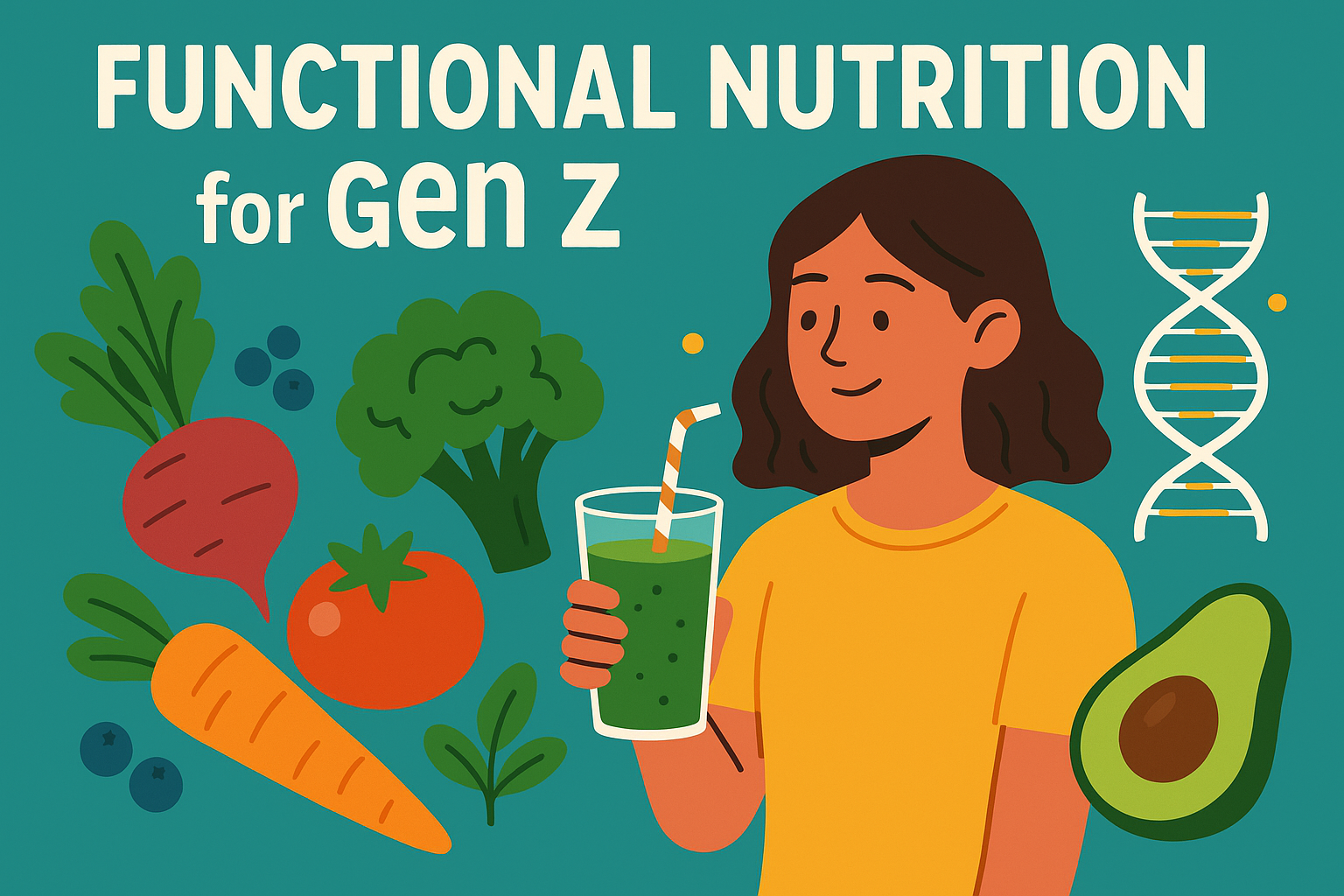Introduction: Functional Nutrition and the Gen Z Shift
The phrase “food as medicine” has transformed from an alternative wellness trend into a mainstream movement—especially among Generation Z. For a generation raised on TikTok health hacks, plant-based recipes, and wellness influencers, food isn’t just fuel—it’s prevention, performance, and healing. This shift toward functional nutrition marks a cultural and generational redefinition of eating habits.
Functional nutrition for Gen Z focuses on foods with added benefits: immunity-boosting smoothies, adaptogen-infused lattes, and gut-friendly probiotics. Unlike earlier generations who might rely on supplements, Gen Z expects their meals to deliver both taste and therapeutic value.
What is Functional Nutrition?
Functional nutrition means eating with purpose—choosing foods that provide specific health benefits beyond basic nutrition. Examples include:
- Probiotics and prebiotics for gut health.
- Omega-3 fatty acids for brain function.
- Turmeric and ginger for anti-inflammatory properties.
- Ashwagandha and adaptogens for stress reduction.
For Gen Z, the appeal lies in the direct connection between diet and well-being. Food is not just sustenance but a form of preventive healthcare.
Why Gen Z is Driving the Trend
Several cultural, economic, and technological shifts explain why Gen Z embraces functional nutrition:
- Digital-native wellness education: Access to Instagram, TikTok, and YouTube health communities.
- Pandemic influence: COVID-19 heightened interest in immunity and resilience.
- Mental health awareness: Gen Z is vocal about anxiety, stress, and sleep disorders—seeking foods that support mental wellness.
- Eco-conscious values: Sustainable, plant-forward diets align with functional foods.
- Holistic lifestyle: Blending fitness, mindfulness, and nutrition into one ecosystem.
Top Functional Foods Popular with Gen Z
- Gut health champions: kombucha, kimchi, kefir, and fiber-rich grains.
- Brain boosters: blueberries, walnuts, salmon, matcha.
- Stress relievers: adaptogenic herbs (ashwagandha, reishi mushrooms, holy basil).
- Energy enhancers: chia seeds, maca powder, and green tea.
- Skin-friendly foods: collagen peptides, aloe vera drinks, and vitamin C-rich fruits.
Functional Nutrition vs Traditional Nutrition
- Traditional nutrition focuses on calories, protein, fats, and carbs.
- Functional nutrition emphasizes how foods influence energy, immunity, digestion, and mood.
For example: oatmeal (traditional nutrition) vs oatmeal with flaxseeds, chia, and probiotics (functional nutrition). Both are healthy, but the latter is optimized for performance and gut support.
Social Media as a Driving Force
Platforms like TikTok and Instagram amplify the functional food movement:
- Short videos demonstrate easy recipes like “sleepy girl mocktails” with magnesium powder.
- Hashtags like #FoodAsMedicine and #GutTok trend with millions of views.
- Influencers create viral challenges around smoothies, collagen shots, or mushroom coffee.
Gen Z doesn’t just consume food—they consume content about food, turning functional nutrition into a cultural identity.
Science Behind Functional Foods
While trends rise fast, many functional foods are backed by legitimate research:
- Probiotics: Multiple studies show their role in gut health and immune regulation.
- Omega-3s: Linked to cognitive development and reduced inflammation.
- Polyphenols: Found in green tea, berries, and dark chocolate—powerful antioxidants.
This scientific validation makes functional foods credible, bridging the gap between fads and facts.
Challenges and Criticism
Despite popularity, functional nutrition has critics:
- Cost barrier: Superfoods like spirulina or collagen are expensive.
- Marketing hype: Some products exaggerate benefits.
- Accessibility: Rural or low-income consumers may not access trendy health foods.
Gen Z, however, is pushing brands to offer affordable and transparent functional food options.
The Role of Brands and Innovation
Food companies are rebranding to meet demand:
- Cereal brands add probiotics and fiber.
- Beverage startups launch “mood-boosting” seltzers.
- Fast food chains experiment with plant-based and functional menu items.
Gen Z’s spending power forces companies to innovate. The line between food, medicine, and lifestyle product is blurring.
Cultural Significance
Functional nutrition is not just a health trend; it’s part of Gen Z’s cultural identity:
- Food as self-care.
- Meal prep as creative expression.
- Grocery shopping as a wellness ritual.
This reflects a broader wellness economy where health is no longer just a medical issue but a lifestyle choice.
Internal & External Linking Opportunities
- Internal links idea: Connect to Scrollistan’s wellness, food trends, or sustainable living articles.
- External links idea: Link to Mayo Clinic articles on functional foods or PubMed research on probiotics and adaptogens.
Suggested Image Ideas
- Colorful smoothie bowls with superfood toppings. (Alt text: smoothie bowl with chia, blueberries, and seeds)
- Young people sharing kombucha or matcha in a café. (Alt text: Gen Z drinking functional beverages)
- Illustration of “food as medicine.” (Alt text: fresh produce styled as pills in a capsule)
Meta Details
- Meta Title: Functional Nutrition for Gen Z: Why Food is Medicine
- Meta Description: Discover how Gen Z is redefining wellness through functional nutrition. Explore food as medicine, trending superfoods, and the science behind them.
- URL Suggestion: scrollistan.com/functional-nutrition-gen-z
Conclusion & Call-to-Action
For Gen Z, functional nutrition is more than a diet—it’s a wellness philosophy. By embracing foods that heal, energize, and prevent, they redefine the role of nutrition in daily life. This generation isn’t waiting for the doctor’s office to tell them what to eat; they are proactively making choices that align health with culture.
👉 Have you tried functional foods that made a difference in your life? Share your experience in the comments and join the conversation on food as medicine.
